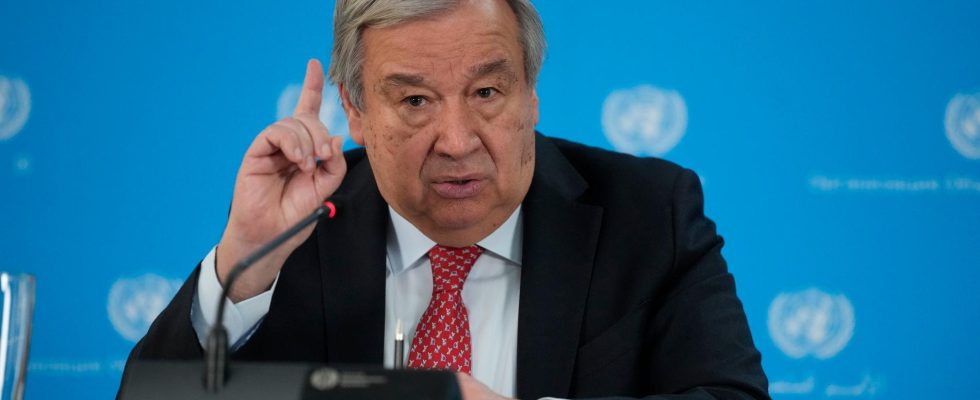full screen
Next
UN Secretary-General António Guterres has called optimism an “illusion” when it comes to climate change. Archive image.
1 / 2Photo: Khalil Senosi/AP/TT
António Guterres’ statements on climate change are becoming increasingly fatalistic.
In the wake of extreme heat, he coined “global boiling”. But what it actually means has been questioned – just like other gloomy statements from the UN chief.
– We are rushing towards a disaster, with eyes wide open, António Guterres said in June last year.
– Cooperate or perish. It is either a pact of climate solidarity or a collective suicide pact, he said at the COP27 climate summit in November.
And this summer, according to the UN Secretary-General, we have reached an era of “global boiling”.
The expression has been questioned by, among others, Piers Forster, professor of climate physics at the University of Leeds in England. He believes that statements that are not based on science in the long run can lead to reduced credibility and make people numb, he tells The Washington Post.
Too little emotion
At the same time, many have pointed out that the climate debate has largely been technical and focused on science, which has not had sufficient effect to achieve greater efforts against climate change. Then the conclusion was that the communication contained too little emotion for people to absorb the knowledge, according to Anke Fischer, professor of environmental communication at the Swedish University of Agriculture, SLU.
Fischer assumes that Guterres adapts the rhetoric to what gives the best results. She does not see it as a problem that, for example, global boiling is not a scientific term.
– I can imagine that Guterres uses the expression so that people can relate to the unbearable heat in some countries this summer, says Fischer to TT.
“Clearer language”
The temperature targets that have been communicated regarding global warming may have made it difficult for many to absorb the whole message, Fischer believes.
– In the past for many years it sounded a bit like if you have passed 1.5 degrees of global temperature increase it is over, but it will get worse and worse if you don’t act. It is a balancing act between using specific objectives but at the same time not letting them appear as the only thing that matters.
Fischer also points to the difficulty of the UN chief communicating to the entire world, to an incredibly large number of different target groups.
– I can imagine that he has used other ways of expressing himself in the past and apparently did not get the reaction he wanted to elicit. Maybe he is therefore trying to use clearer language, she says.
Existential fear
Jim Skea, newly appointed head of the UN’s climate panel IPCC, has promised that during his time in office he will contribute with a “mixture of realism and optimism”, including that humanity is not powerless when it comes to global warming.
He believes that one should not only make statements that can evoke a sense of existential fear for the future of the planet.
– We have to point out that people can actually make choices and have influence over their own future, Jim Skea told the AFP news agency.
Guterres has previously called optimism about the state of the climate “an illusion”. But he is also careful to convey the message that the world still has a chance to prevent the worst disaster, points out Anke Fischer.
– Guterres tries to maintain and promote the motivation to act and to increase ambition. He doesn’t paint a completely bleak picture of the future for us, but uses this to reach different target groups that they should act together.
THE FACTS António Guterres
António Guterres is the ninth Secretary-General of the United Nations and has held the post since 1 January 2017 when he succeeded Ban Ki-Moon.
Guterres was previously head of the UN refugee agency UNHCR.
Between 1995 and 2002, Guterres was Prime Minister of Portugal and before that sat in the country’s parliament for 17 years for the Socialist Party (Partido Socialista, PS).
He was born in 1949 in the Portuguese capital of Lisbon and has an engineering degree from the Instituto Superior Técnoco in Lisbon. He speaks Portuguese, English, French and Spanish fluently.
Sources: UN, National Encyclopedia
Read more
